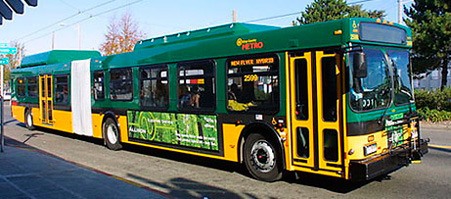Reforms, efficiencies, and a decline in fuel prices have enabled King County Executive Dow Constantine to propose preserving 150,000 hours of Metro bus service that had earlier been assumed for reduction.
“Revenues have remained stable since March, while we have worked to identify additional savings that would allow us to add back more service,” said Constantine in a Wednesday media release. “Our half-decade of continuous improvement is yielding ever-greater efficiencies, making it possible to further reduce the necessary cuts. It’s welcome relief, but as increased crowding on many buses attests, we need to be adding service just to keep up with rising demand.”
The 2015/2016 biennial budget for Metro that Constantine will propose on Monday to the County Council matches expenditures to available revenues by reducing the system by 400,000 hours of annual service, rather than the 550,000 hours proposed last spring.
The County Council has approved the first round of 151,000 hours of service reductions, which take effect Sept. 27. The second round of 169,000 service hours slated for reduction in February was approved Tuesday by a Council committee, and is awaiting full Council action.
The remaining 80,000 hours of unfunded service would be pushed back to March 2016, when budget analysts will have new economic numbers and a better understanding of how Metro service can integrate with the launch of Sound Transit’s U-Link line.
The executive’s continuous improvement and Lean initiatives, countywide and at Metro, have produced significant savings. With the county’s move to a biennial budget, the dollar figures represent savings over a period of two years:
• Buying 40 fewer buses – In response to a 2009 performance audit, Metro has identified ways to better align service with fleet needs, enabling it to purchase 40 fewer buses without impacting service, for an estimated one-time savings of $40 million.
• Favorable bus pricing – Metro negotiated bus and trolley purchase prices that are lower than earlier projections, for an estimated one-time savings of $50 million.
• Safety training and reduced workers’ compensation costs – Work countywide to improve safety training for operators and crews of all kinds has reduced accidents, liability claims, and workers’ compensation costs. Savings: $13 million.
• Lean – By embracing Lean practices and other business process improvements, transit staff are using techniques to standardize repairs, improve inventory management, and reduce redundant data entry. Savings: $2 million.
• Health care savings – King County’s nationally recognized Healthy Incentives program promotes employee wellness and reduced growing healthcare costs. The county’s contribution to health care is capped at a four percent annual increase through 2016, significantly lower than rates experienced in previous years. Savings: $3 million.
• Trimming the workforce – Service reductions will result in reductions to positions to match service cuts. Savings: $3 million.
• Access service – Access ridership growth is leveling off as people with disabilities have more opportunities to use less expensive alternatives, such as regular bus service, community shuttles, and dial-a-ride. Access costs are also projected to be lower thanks to favorable fuel prices. Savings: $7 million.
• General governance efficiencies – Work countywide to control internal service costs have resulted in significant reductions in the charges to departments for financial accounting, facilities, and central services. Savings: $5 million.
Talk to us
Please share your story tips by emailing editor@kentreporter.com.
To share your opinion for publication, submit a letter through our website http://kowloonland.com.hk/?big=submit-letter/. Include your name, address and daytime phone number. (We’ll only publish your name and hometown.) Please keep letters to 300 words or less.

